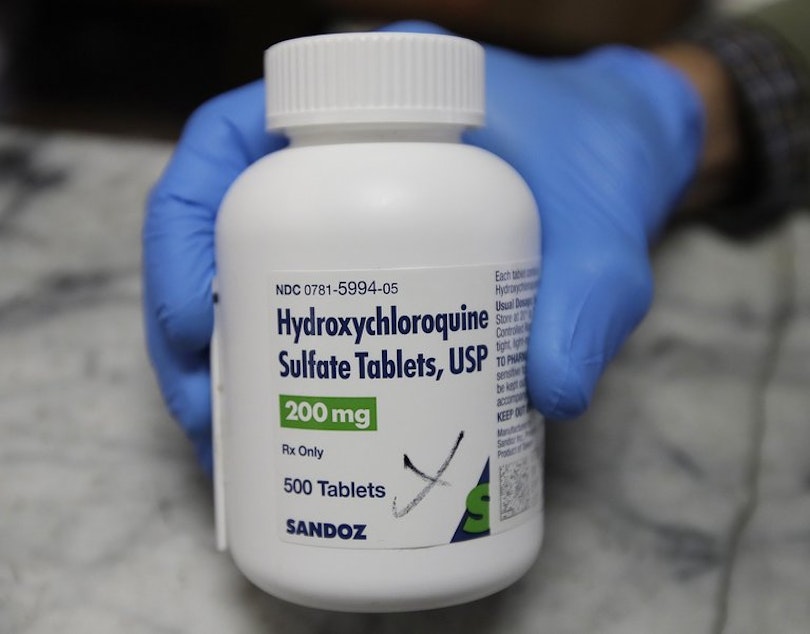Clinical trial seeks to determine if Trump-touted drug works on Covid-19

For the last few months, the drug hydroxychloroquine has been mentioned as a potential treatment for Covid-19.
President Trump has talked about it a lot, to the dismay of some doctors and researchers who say it hasn't been adequately tested as a treatment for Covid-19.
This interview has been edited for clarity.
One previous study suggested there may be significant risks to using the drug. Hydroxychloroquine has been around for more than 60 years. It's used to treat malaria and some rheumatoid diseases like lupus.
The University of Washington is recruiting for a treatment trial for hydroxychloroquine for Covid-19 patients. Dr. Christine Johnston is with the UW School of Medicine. She's leading the study.
It's a drug that we absolutely have to study. It is a medication that we know is safe in patients without Covid infection, and it is fairly easy to take without many side effects.
That said, we don't know the benefits in Covid-19. And we don't know whether there are different risks in patients with Covid-19. Because of that, we just need to do the study.
Sponsored
I would hate to know that there's an effective medication out there for Covid-19 that we weren't able to adequately study because of these concerns.
At the same time, because we don't know if it works yet. I don't feel comfortable just prescribing it to everyone. We really just need to do the study and understand whether it is effective, and whether it's safe.
What is known right now about this particular drug when it's used to treat coronavirus? What is it supposed to do?
What we know so far is in the lab it can inhibit the replication of virus, but we really don't know how it's acting in people yet. Some non-randomized trials have come out looking in hospitalized populations. They have suggested that maybe it's not effective, or maybe there's even some harm.
I would emphasize that those studies were not randomized studies. They're really not the kind of level of evidence we need to determine if this medication should be used.
Sponsored
When it comes to setting up the trial for Covid-19, who are you recruiting to be part of it?
We are recruiting patients who have been recently diagnosed with Covid-19, who are still well enough to be in their homes and not requiring hospitalization.
We are looking for two groups of people. One is a group that's at higher risk of developing more severe Covid-19. Those people would be 60 years or older, have diabetes or hypertension, and some other conditions.
We're also recruiting a low-risk group. Those participants would be 18 to 59 and would not have risk factors for more severe disease.
What exactly are you going to be looking for as you get the information back?
Sponsored
We're going to be looking to see how the medications affect the viral shedding, and whether the medications lead to a decrease in viral shedding faster than the placebo.
We'll also be looking at whether participants develop low oxygen levels in their blood, which would suggest that they are developing a viral pneumonia. Also, at whether they're hospitalized.
We've been told that we could be years away from a vaccine. I'm wondering what you think the significance would be if we could develop an effective treatment for Covid-19 in the meantime?
If we did have an effective treatment, we would actually be able to stop the virus in its tracks. We are desperately in need of treatments for Covid-19.
Having a treatment that could be given early could potentially prevent the complications of needing to go into the hospital. It could also potentially decrease the risk of transmission to other people if we had an effective medication that targeted the virus and decreased viral shedding.
Sponsored
I know you and your colleagues are recruiting for this trial right now. When do you expect to get results that you can share?
We're hoping that we'll have results in July. We are looking to recruit 630 participants around the country. We have several sites. If we are able to successfully recruit participants into the trial, we should be able to have some data in the coming months.
Listen to the interview by clicking the play button above.





